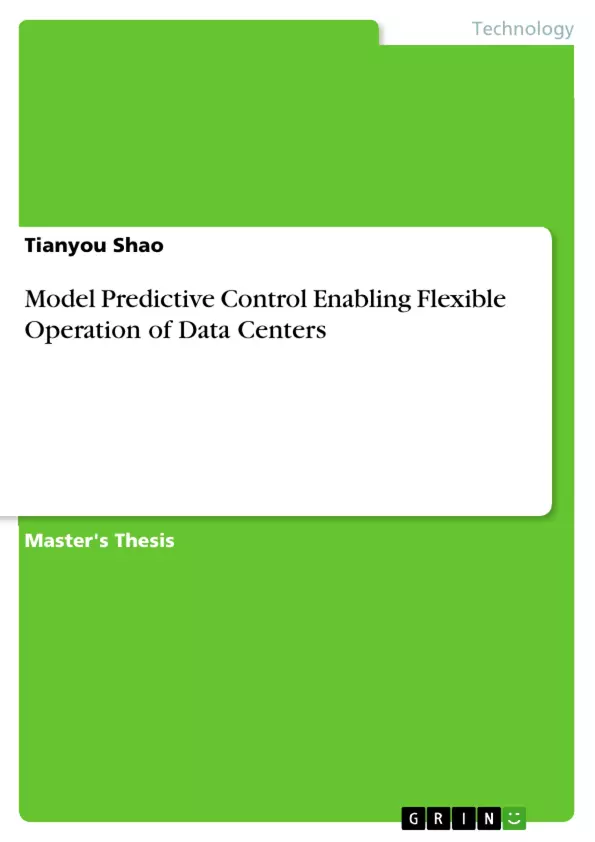To rise to the challenge of the growing number of distributed Renewable Energy Sources (RES) for grid integration, Ancillary Service (AS) is increasingly crucial to maintaining the stability of power grid worldwide. In recent years, discussions about Data Centers (DCs) no longer limit to their energy efficiency. Considering the rising rigid demand from ICT customer and the high energy demand of DC, it is possible for DC to be one of Demand Response (DR) resources providing ASs in the smart grid.
This thesis presents an online energy-aware scheduling algorithm based on Model Predictive Control (MPC), which realizes a proper adjustment of DC power demand, enabling the flexible operation of DC. The present work focuses on the identification
and implementation of an MPC strategy which aims at a proper scheduling for DC which makes the total power consumption of DC flexible to track the reference signal in a DR context. It is demonstrated how the combination and interaction of the components under DC architecture can be utilized to achieve the realizable potential of operational flexibility for AS. Numerical simulation results have been carried out aimed at the later application in real pilot DCs. Furthermore, the capacity of resisting disturbance of this MPC approach has been discussed.
Inhaltsverzeichnis (Table of Contents)
- Einleitung (Introduction)
- Grundlagen (Fundamentals)
- Modellprädiktive Regelung (Model Predictive Control)
- Ancillary Service (Ancillary Service)
- Demand Response (Demand Response)
- Rechenzentren (Data Centers)
- Thermal Modeling
- Systemmodell (System Model)
- Modell des Rechenzentrums (Data Center Model)
- Modell des Energiesystems (Energy System Model)
- Modellprädiktive Regelung für Rechenzentren (Model Predictive Control for Data Centers)
- Zielsetzung und Entwurf (Objective and Design)
- Implementierung und Validierung (Implementation and Validation)
- Anwendungsbeispiele (Application Examples)
- Zusammenfassung und Ausblick (Summary and Outlook)
Zielsetzung und Themenschwerpunkte (Objectives and Key Themes)
This master thesis aims to investigate the potential of data centers (DCs) as a Demand Response (DR) resource for providing Ancillary Services (AS) in the smart grid. The focus is on developing a Model Predictive Control (MPC) based scheduling algorithm to enable flexible operation of DCs by adjusting their power demand in response to grid requirements.
- Exploring the potential of DCs as DR resources for AS provision.
- Developing an MPC-based scheduling algorithm for flexible DC operation.
- Analyzing the interaction between DC components and their influence on operational flexibility.
- Evaluating the robustness and performance of the proposed MPC strategy through numerical simulations.
- Discussing the impact of the developed approach on the energy efficiency of DCs.
Zusammenfassung der Kapitel (Chapter Summaries)
- Einleitung (Introduction): This chapter provides a comprehensive overview of the research context, highlighting the challenges posed by increasing renewable energy integration and the potential role of DCs in providing AS. It introduces the concept of DR and the significance of flexible DC operation.
- Grundlagen (Fundamentals): This chapter delves into the theoretical foundations of key concepts relevant to the research, including MPC, AS, DR, DC architecture, and thermal modeling. It discusses the principles and methodologies associated with these concepts, laying the groundwork for the subsequent chapters.
- Systemmodell (System Model): This chapter details the modeling aspects of the research, outlining the development of models for the DC and the energy system. It describes the components considered in the models, their interactions, and the parameters used for simulation purposes.
- Modellprädiktive Regelung für Rechenzentren (Model Predictive Control for Data Centers): This chapter presents the core of the thesis, focusing on the development and implementation of the MPC-based scheduling algorithm. It explains the algorithm's design, control objectives, and the optimization strategies employed to achieve flexible DC operation.
Schlüsselwörter (Keywords)
This thesis focuses on the utilization of Data Centers (DCs) as Demand Response (DR) resources to provide Ancillary Services (AS) in the smart grid. The research utilizes Model Predictive Control (MPC) as a tool to enable flexible operation of DCs. Key aspects explored include thermal modeling, deferrable workloads, Uninterruptible Power Supplies (UPS), ARIMA prediction, regulation commands, and load following.
Frequently Asked Questions
What is Model Predictive Control (MPC) in the context of data centers?
MPC is used as a scheduling algorithm to adjust a data center's power demand, enabling it to track reference signals for grid stability.
How can Data Centers (DCs) support the smart grid?
DCs can act as Demand Response (DR) resources, providing Ancillary Services (AS) to balance the grid, especially with increasing renewable energy sources.
What components of a DC are utilized for flexibility?
Flexibility is achieved through the interaction of components like deferrable workloads, thermal management, and Uninterruptible Power Supplies (UPS).
Does this approach affect energy efficiency?
The thesis discusses how flexible operation for grid services can be balanced with the overall energy efficiency of the data center.
How is the performance of the MPC strategy validated?
The strategy is evaluated through numerical simulations aimed at future applications in real pilot data centers.
- Citation du texte
- Tianyou Shao (Auteur), 2017, Model Predictive Control Enabling Flexible Operation of Data Centers, Munich, GRIN Verlag, https://www.grin.com/document/389058



